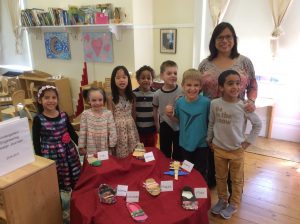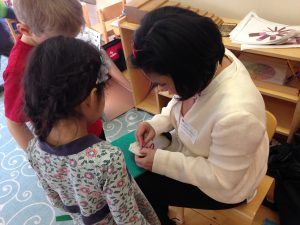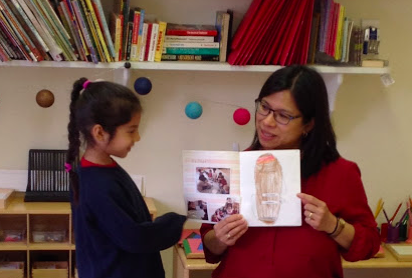MIT Alumni Spotlight: Melanie Flores
Melanie Flores
Founder of the Kindergarten Engineering Design Workshop @ Kingsley Montessori School
B.S. Chemical Engineering, 1992
By Julie Guerette
As the pK-12 Action Group expands, we are constantly meeting more people and learning about new programs. Even as we work with educators and students from around the world, the MIT community remains vitally important to us as we draw inspiration from all the accomplishments MIT alumni have made locally and around the world. To recognize all these achievements, this will be the first of many MIT Alum Spotlights where we will visit and/or interview MIT alumni and discover the paths they took after graduation that led them to careers in pre K-12 STEM education.
I first met Melanie Flores ‘92 at the LearnLaunch conference at the Hynes Convention Center in February. When she came up to the MIT pK-12 table, her enthusiasm was contagious and she quickly explained to me that she was an alum herself and had co-created a workshop where Kindergarten students could become engineers themselves. We exchanged contact information, and I heard from her the next week asking how she could contribute to our efforts.

Melanie and the Kindergarten Engineering students we visited.
We were then graciously invited to visit the Kindergarten Engineering Design Workshop at Kingsley Montessori School in Boston where Melanie is a Technology and Engineering Teacher.
As an MIT alum, Melanie understands our goal to bring MIT’s unique “mens et manus” learning approach beyond the campus to learners around the world. It was this approach to learning that she was so inspired by in Course 2.007, made famous by professor Woodie Flowers in the 1970s and still one of the most popular courses for MIT students today. Melanie proudly showed us the email Flowers sent her congratulating her on the inspirational way she brought Course 2.007 to her Kindergarten Engineering Design Workshop.
Before class began, Melanie explained to us that the students are given the task of designing a shoe using only “scrap” items, such as elastics, cardboard, cloth, bubblewrap, etc. The shoe must be durable enough to be walked in and sustain the “jump” test of 10 jumps and still remain intact. Melanie went on to explain that they are taught the engineering process of creating something of their own while given challenging design criteria. At the end of the workshop, they present their shoe design in a formal presentation to their peers and teachers.

MIT pK-12 Associate Director Claudia Urrea working with a student to build a sturdier shoe design.
We had the pleasure of observing the class and seeing the engineering process behind the shoe design at the Kindergarten Engineering Design Workshop. One student, determined to make his flip flop (made of yarn, duct tape, and cardboard) pass the “jump” test, scrunched up his toes and held on for dear life. However, as “Miss Melanie” always says, you didn’t really engineer if you’re done the first time. He went back and added a plastic support to the back to the sandal which made it a much better candidate for the jump test.
In a quieter moment, I had the chance to speak with Melanie about the importance of getting children interested in not just science and math, but also introducing them to engineering and inventing at a young age. It is essential that students do not have to wait to enroll in an engineering class in college to have the opportunity to create or design things. These five-year-olds exuded the curiosity and confidence of professional engineers and had fun in the process. We hope that this is the first of many Kindergarten Engineering Design Workshops that will inspire children to become scientists and engineers. You can read more about the workshop that Melanie Flores, with the help of over a dozen teachers in seven classrooms, created in her own words here.


Comments are closed.